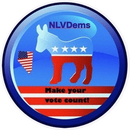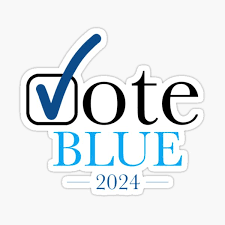North Las Vegas Democratic Club
recommends the following sites for voting information.
recommends the following sites for voting information.
To find out if you are registered to vote or to register, go to Vote.org
|
Go to the link below to make sure your vote counted.
https://nevada.ballottrax.net/voter/ Nevada’s official site to track, view, and receive messages about the status of your ballot.
|
REGISTER TO VOTE Elect Democrats to protect abortion rights, pass commonsense gun safety laws, protect LGBTQ+ rights, expand access to healthcare, address the climate crisis… and save democracy itself!
|
|
Ballotpedia - The Biden Administration
https://ballotpedia.org/Joe_Biden_presidential_administration |
Youth Are Turned Off by the 2024 Election. We Can Still Engage and Mobilize Them. The secret to engaging young voters?
Talk, listen and focus on their big issues. By Kei Kawashima-Ginsberg Contributor
July 11, 2024, at 6:00 a.m.
|
People listen during the Young Republicans' Presidential debate watch party on June 27, 2024, in New York.
With less than four months to go before the 2024 presidential election, young voters are at a crossroads. On the one hand, they are interested in the election and intend to participate. According to a new U.S. News-Generation Lab poll of young adults aged 18-34, 73% have given some or a lot of thought to the upcoming election. Sixty-one percent believe it will be one of the most important elections in history – and half say they will “definitely” vote. Nikki Haley Endorses Donald Trump in RNC SpeechOn the other hand, many young people feel their lives have gotten worse, and they are disappointed with both major candidates for president. Only 31% of those 2,000 young adults polled in late June and early July in the battleground states of Arizona, Georgia, Michigan, Nevada, Ohio, Pennsylvania and Wisconsin say they are better off than they were four years ago. That time-tested question, famously posed by Ronald Reagan in 1980, is often an indicative bellwether of how the election goes. Forty-nine percent of young adults say they’re still deciding whom to vote for or could be easily convinced to change their mind. And when asked about the most notable accomplishments of President Joe Biden or former President Donald Trump, their most common answer was: nothing. These findings reflect what we’ve seen in our own work studying youth civic engagement at the Center for Information & Research on Civic Learning and Engagement, or CIRCLE, part of Tufts University’s Jonathan M. Tisch College of Civic Life. Young people are engaged and interested in political action, but often disillusioned by democratic institutions and dissatisfied with their electoral choices. At the heart of those apparent contradictions are three key facts about young people that also serve as lessons on how to engage them in 2024 and beyond. |
Young Voters Need More Information
Almost half of youth in the U.S. News-Generation Lab poll said they are “minimally committed” or “uncommitted” about whom to vote for. That is not necessarily a sign of disengagement; some youth may be in the midst of making up their minds. Others may be sending a message about their disappointment in one or both candidates, as they did through the nationwide “Uncommitted” movement in the Democratic primary.
But many other youth simply don’t know enough yet to make their choice. We have found in CIRCLES’s own surveys of youth ages 18-34 that uncommitted voters tend to lack access to relevant information about issues, candidates and the process for registration and voting itself.
Some of that lack of information is due to insufficient outreach to young people. Our pre-2024 election survey conducted late last year found that only 19% of youth had heard from a political party or campaign about political issues or the election, and just 14% had heard from a local community organization. Contact is critical: When you talk to young people about issues and elections, they are more likely to turn out and cast a ballot.
Youth Have Diverse Issue Priorities
It’s vital to listen to young voters – especially about the issues that may motivate them to vote. Young people are issue voters: They are less likely to identify with political parties or to trust individual politicians. Understanding their concerns and priorities is crucial, especially when they are not feeling inspired by candidates on the ballot.
Both the U.S. News-Generation Lab poll and our own research find that inflation and the cost of living are by far young people’s top issue this cycle. At the same time, our research has also found that youth who prioritize inflation or jobs are less likely to say they will vote this November. That suggests both parties have a lot of work to do to sell youth on their economic message.
Beyond economics, young people are notable for caring about a wide range of issues, from climate change and gun violence to abortion access. In our pre-2024 election survey, 10 different issues were chosen by at least 10% of youth as one of their top three priorities. That means millions of young potential voters care about issues like racial justice, immigration and student loan debt.
Campaigns and communities cannot assume that taking action on a single issue will win them “the youth vote.” Instead, they must invest in understanding what different communities care about and speak to them accordingly.
Young People Are Not A Monolith
It is wrong to talk about “the youth vote” as a single group in the first place. Today’s youngest eligible voters are part of the most diverse generation in American history: Nearly half are youth of color and more than 1 in 5 are LGBTQ+. Their identities and experiences run the gamut, and as we work to meet young people where they are, that means meeting them in a thousand different places.
If we don’t do that, we fail to address some of the deepest inequalities in our democracy. For decades, youth of color have voted at lower rates than white youth, and youth without college experience have voted at lower rates than those with a college degree.
Polling suggests we are in danger of repeating those trends this year. Both our own research and the U.S. News-Generation Lab poll reveal double-digit differences in likelihood to vote between white youth compared with Black and Latino youth, and between college and non-college youth.
These young people often face deeper barriers to voting because of their race or ethnicity or educational attainment. Addressing those barriers requires deep and sustained effort, but it’s the work we must do to expand and build a truly representative electorate.
These truths about youth can be real challenges to mobilizing them. But they are also opportunities to help them grow as voters and leaders far beyond this election cycle. How well we do that work in the months ahead will determine whether young people once again have historic voter turnout – as they did in 2020 – and how they will shape the future of our democracy.
Kei Kawashima-Ginsberg is the Newhouse Director of the Center for Information & Research on Civic Learning and Engagement (CIRCLE), a national nonpartisan research organization at Tufts University’s Jonathan M. Tisch College of Civic Life.
Tags: politics, 2024 presidential election, young voters
Almost half of youth in the U.S. News-Generation Lab poll said they are “minimally committed” or “uncommitted” about whom to vote for. That is not necessarily a sign of disengagement; some youth may be in the midst of making up their minds. Others may be sending a message about their disappointment in one or both candidates, as they did through the nationwide “Uncommitted” movement in the Democratic primary.
But many other youth simply don’t know enough yet to make their choice. We have found in CIRCLES’s own surveys of youth ages 18-34 that uncommitted voters tend to lack access to relevant information about issues, candidates and the process for registration and voting itself.
Some of that lack of information is due to insufficient outreach to young people. Our pre-2024 election survey conducted late last year found that only 19% of youth had heard from a political party or campaign about political issues or the election, and just 14% had heard from a local community organization. Contact is critical: When you talk to young people about issues and elections, they are more likely to turn out and cast a ballot.
Youth Have Diverse Issue Priorities
It’s vital to listen to young voters – especially about the issues that may motivate them to vote. Young people are issue voters: They are less likely to identify with political parties or to trust individual politicians. Understanding their concerns and priorities is crucial, especially when they are not feeling inspired by candidates on the ballot.
Both the U.S. News-Generation Lab poll and our own research find that inflation and the cost of living are by far young people’s top issue this cycle. At the same time, our research has also found that youth who prioritize inflation or jobs are less likely to say they will vote this November. That suggests both parties have a lot of work to do to sell youth on their economic message.
Beyond economics, young people are notable for caring about a wide range of issues, from climate change and gun violence to abortion access. In our pre-2024 election survey, 10 different issues were chosen by at least 10% of youth as one of their top three priorities. That means millions of young potential voters care about issues like racial justice, immigration and student loan debt.
Campaigns and communities cannot assume that taking action on a single issue will win them “the youth vote.” Instead, they must invest in understanding what different communities care about and speak to them accordingly.
Young People Are Not A Monolith
It is wrong to talk about “the youth vote” as a single group in the first place. Today’s youngest eligible voters are part of the most diverse generation in American history: Nearly half are youth of color and more than 1 in 5 are LGBTQ+. Their identities and experiences run the gamut, and as we work to meet young people where they are, that means meeting them in a thousand different places.
If we don’t do that, we fail to address some of the deepest inequalities in our democracy. For decades, youth of color have voted at lower rates than white youth, and youth without college experience have voted at lower rates than those with a college degree.
Polling suggests we are in danger of repeating those trends this year. Both our own research and the U.S. News-Generation Lab poll reveal double-digit differences in likelihood to vote between white youth compared with Black and Latino youth, and between college and non-college youth.
These young people often face deeper barriers to voting because of their race or ethnicity or educational attainment. Addressing those barriers requires deep and sustained effort, but it’s the work we must do to expand and build a truly representative electorate.
These truths about youth can be real challenges to mobilizing them. But they are also opportunities to help them grow as voters and leaders far beyond this election cycle. How well we do that work in the months ahead will determine whether young people once again have historic voter turnout – as they did in 2020 – and how they will shape the future of our democracy.
Kei Kawashima-Ginsberg is the Newhouse Director of the Center for Information & Research on Civic Learning and Engagement (CIRCLE), a national nonpartisan research organization at Tufts University’s Jonathan M. Tisch College of Civic Life.
Tags: politics, 2024 presidential election, young voters
North Las Vegas Democratic Club Mission
To create a government FOR EVERYONE
that truly adheres to the preamble by establishing
justice, insuring domestic tranquility,
providing for our common defense, promoting
general welfare, and securing our liberties.
that truly adheres to the preamble by establishing
justice, insuring domestic tranquility,
providing for our common defense, promoting
general welfare, and securing our liberties.
North Las Vegas Democratic Club Vision
Create community awareness and involvement to promote
Democratic policies, causes, and candidates both locally and nationally.
Democratic policies, causes, and candidates both locally and nationally.



